| Srl | Item |
| 1 |
ID:
140729
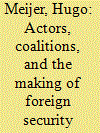

|
|
|
|
|
| Summary/Abstract |
In light of the intertwining logics of military competition and economic interdependence at play in Sino–American relations, this paper examines how the United States has balanced conflicting national security and economic interests in the making of US export control policy on defense-related technology toward China. Relying upon a large body of primary sources (including 170 interviews), it seeks to contribute to the understanding of this strategically sensitive yet neglected area of Sino–American relations. It is shown that, as a consequence of the erosion of the US capacity to control the diffusion of defense-related technology to China in the post-Cold War era, a growing set of actors within the United States has reassessed the security/economic calculus in Washington's relationship with Beijing. Specifically, this coalition advocates the streamlining of export controls to sustain the defense and technological industrial base and thereby maintain American military/technological preeminence vis-à-vis a rising China.
|
|
|
|
|
|
|
|
|
|
|
|
|
|
|
|
| 2 |
ID:
160741
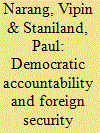

|
|
|
|
|
| Summary/Abstract |
Identifying the links between democracy and foreign security policy has proven elusive. This paper engages this research agenda by developing a novel theory of “accountability environments” and exploring it in the case of India. We hypothesize that the varying electoral salience of foreign security policy and the clarity of responsibility for policy outcomes combine to create different accountability environments in which politicians operate. Accountability environments determine the incentives that politicians face for devoting effort to external security issues. We illustrate the argument with evidence from India over time and across issue areas (India, Pakistan, and defense procurement/development). Scholars need to incorporate the complexities and diversity of representation and rule into the study of democratic politics and international relations.
|
|
|
|
|
|
|
|
|
|
|
|
|
|
|
|
| 3 |
ID:
141530
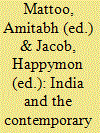

|
|
|
|
|
| Edition |
1st ed.
|
| Publication |
New Delhi, Manohar Publishers and Distributors, 2014.
|
| Description |
366p.hbk
|
| Series |
Australia India Institute Foreign Policy Series; 3
|
| Standard Number |
9789350980385
|
|
|
|
|
|
|
|
|
|
|
|
Copies: C:1/I:0,R:0,Q:0
Circulation
| Accession# | Call# | Current Location | Status | Policy | Location |
| 058332 | 327.54/MAT 058332 | Main | On Shelf | General | |
|
|
|
|
| 4 |
ID:
091582
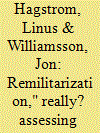

|
|
|
|
|
| Publication |
2009.
|
| Summary/Abstract |
This article analyzes Japanese foreign security policy and recent talk of "remilitarization." It does so by assessing the changes that most closely parallel the analytical interests of three sets of major international relations theories: namely capability (realism), policy (liberalism), and normative context (constructivism). Japanese responses to recurring North Korean missile tests moreover provide a source for a contextually bound analysis of policy and self-image. The article confirms that the last two decades have witnessed a number of important changes in security aspects of Japanese foreign policy but concludes that these changes are not nearly so dramatic as to justify the bold language of many Japan specialists. Hence, it serves to moderate the scholarly tendency to overemphasize or overly dramatize the changes in Japanese security policy.
|
|
|
|
|
|
|
|
|
|
|
|
|
|
|
|
| 5 |
ID:
098280
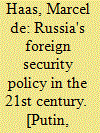

|
|
|
|
|
| Publication |
London, Routledge, 2010.
|
| Description |
xviii, 211p.
|
| Series |
Contemporary security studies
|
| Standard Number |
9780415477307, hbk
|
|
|
|
|
|
|
|
|
|
|
|
Copies: C:1/I:0,R:0,Q:0
Circulation
| Accession# | Call# | Current Location | Status | Policy | Location |
| 055177 | 355.033547/HAA 055177 | Main | On Shelf | General | |
|
|
|
|